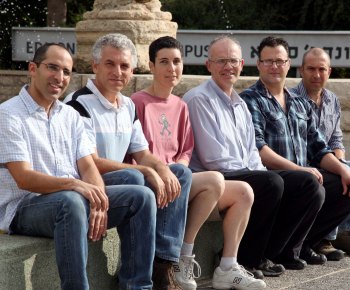| | 09 November, 2010
| | 10 HU young researchers awarded European Union research grants worth more than 12 million euros | |
 | | From front to back: Prof. Nathalie Balaban, Dr. Sebastian Kadener, Dr. Alex Binshtock, Prof. Yuval Dor, Prof. Orit Kedar, Dr. David Hay, Dr. Roie Yerushalmi, and Vice President for Research & Development Prof. Shy Arkin (Photo: Sasson Tiram) |
|
Ten young researchers at the Hebrew University of Jerusalem have been awarded competitive research grants by the European Research Council (ERC), totaling more than 12 million euros. The achievement places the Hebrew University first in Israel in the number of grants awarded to its researchers this year from the ERC.
The ERC research grants have been awarded since 2007 to researchers who have excelled in their achievements and are embarking on independent research. The winners are chosen among thousands of researchers who present proposals from across Europe for outstanding, ground-breaking research and demonstration of real potential for conducting an independent, continuing career in their field of research. This year, 400 grants were awarded, 6 percent of them (25) awarded to Israeli researchers.
The achievement places the Hebrew University third in Europe in the number of grants its young researchers received in the last three years (total of 20 grants) from the ERC. In Europe, the largest number of grants awarded since 2007 is to researchers at Cambridge University (25 grants) and to researchers at Oxford University (23 grants).
The ten Hebrew University researchers are:
Prof. Orit Kedar of the department of political science is examining how democracies are partitioned along and across community lines into electoral districts of various sizes. Her project analyzes the effect of alternative partitions into districts on representation and party systems.
The project of Dr. Alex Binshtok of the department of medical neurobiology aims to integrate analysis at different levels of pain perception in normal and pathological conditions in order to elucidate mechanisms underlying chronic pain. He hopes that his research will elucidate new potential targets for the treatment of inflammatory and neuropathic pain and the development of new pain-specific anesthetic drugs.
Prof. Nathalie Q. Balaban- of the Racah Institute for Physics proposes a new biological physics approach for understanding the evolution of antibiotic resistance. Her goal is to reach a quantitative and predictive understanding of how antibiotic resistance evolves in bacterial populations.
The project of Dr. Sebastian Kadener of the department of biological chemistry is about the biological clock and the way our body keeps time. He plans on using fruit flies to understand how a specific neuronal network organizes the information about time it receives from individual neurons, and how the neuronal network uses this information in order to generate a strong and coherent behavioral output (sleep-wake cycles).
The project of Dr. Alexander Kulik of the department of Central and Eastern European cultures on Jews and Slavs in the Middle Ages aims to reconstruct the Jewish and Slavic legacies, by focusing on previously unexplored or under-explored medieval texts, to build a model of cross-cultural interaction to achieve a better understanding of the situations in which different faith-based ethnic cultures cohabit.
Dr. Pawel Maciejko of the department of Jewish thought discusses the Jewish-Christian interchange in early modern East-Central Europe in light of an analysis of Jewish theological elaborations of conversion to Christianity. By attempting to reconstruct the theological conceptualizations of conversions (and not – as did other scholars – biographies of the converts), his project challenges the prevailing scholarly paradigm of the existence of clear and impenetrable boundaries between Judaism and Christianity.
The research of Dr. Roie Yerushalmi of the Institute of Chemistry and the Center for Nanoscience and Nanotechnology focuses on the synthesis and assembly of nanostructures and understanding of unique reactivity characteristics related to the nanoscale. His ERC funded research will focus on the design and study of nanometric structures that combine inorganic and organic parts for harvesting light energy.
Prof. Ilan Kremer from the school of business administration is focusing on the information flow and its impact on financial markets. The objective is to contribute to bridging the gap between information economics, accounting, and asset-pricing. For example, during the recent crisis, investors were unaware of the risk undertaken by banks. The way this information was revealed greatly influenced the way the crisis developed. In many cases, the information was disclosed when it was almost too late to act. Therefore, Kremer plans to develop dynamic models in which privately informed firms decide on how and when to communicate. The models would incorporate several firms such that each firm must take into account market conditions and information revealed by the other firms. The second objective is to derive a rich set of testable asset-pricing implications that can be empirically tested.
Perhaps the major approach to identifying cyber attacks and malware (such as viruses and spam) in the network is to compare the content of the traffic with a set of strings (or signatures) that is typical to these programs. This comparison must be performed at a very high rate. The research of Dr. David Hay of the Rachel and Selim Benin School of Computer Science and Engineering will develop efficient algorithms for performing this task and to cope with the continuously increasing Internet demands and number of signatures. He intends to provide hybrid hardware and software schemes that will use recent advances in hardware.
The research of Prof. Yuval Dor focuses on the mechanisms that control the replication of insulin-producing pancreatic beta cells. Based on a novel technology developed in Prof. Dor's lab, rare replicating pancreatic beta cells can be isolated and studied in detail. The long-term goal of this research is to understand in sufficient detail the determinants of beta cell replication, so as to develop new drugs that will increase the number of beta cells in diabetes patients, which has the potential to cure diabetes.
|
Downloadable File: ERC2010.doc |
|


